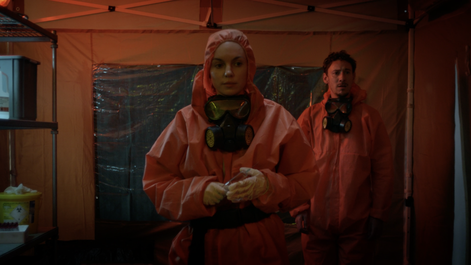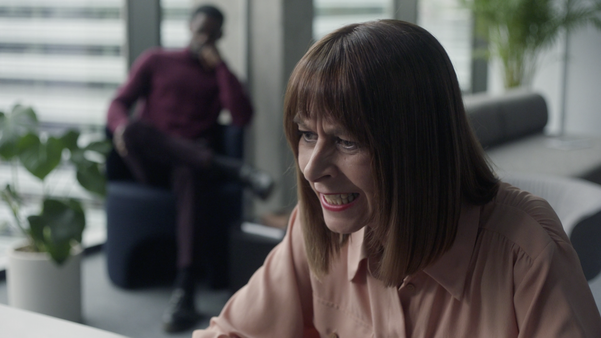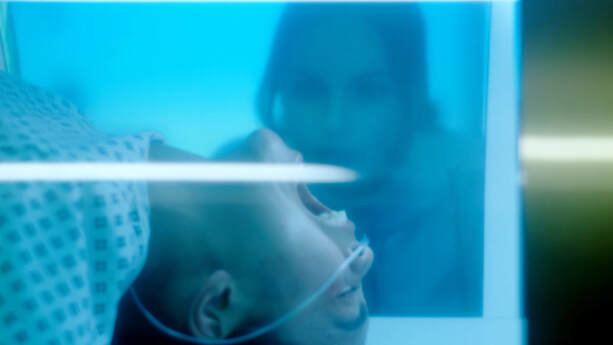 As a fan of all forms of interactive fiction, I’m always eager to immerse myself in new experiences... ...After playing through the latest title from Wales Interactive, it’s safe to say that the word, “immersion” alone doesn’t do this game justice. The Complex reaches out and throws you into its exciting narrative, giving you agency over the game’s characters and the choices they make. I had the pleasure of speaking to both director Paul Raschid (White Chamber) and writer Lynn Renee Maxcy (The Handmaid's Tale) and they were kind enough to provide me with some excellent insight into the creative process, the characters and where they see interactive media in the future. Killer Horror Critic: What drew you to The Complex, and what were the challenges of filming this type of narrative, which has so many different outcomes? Paul Raschid: The opportunity to work with the team behind it: John Giwa-Amu, Jade Alexander and Lynn Renee Maxcy are fantastic and have been so supportive of my vision. Aside from that, the interactive format is something I really believe in so I jumped at the opportunity to be involved in this project. The biggest additional challenge of shooting interactive, was that we needed to shoot about double the content you would need for a linear film to cover all the different narrative branches and emotional variations amongst the characters. Beyond that, the shooting process was quite fragmented as we needed to shoot many small scenes in isolation that could be inputted into the game engine as they could lead to any number of different scenes. Furthermore, an extra close eye had to be kept on any continuity issues that could cause us problems on other narrative branches. With regards to the outcomes, my main creative challenge/objective was to make sure each denouement was thrilling and a fulfilling conclusion to whichever path was taken by the viewer/player. KHC: Lynn, The Complex has nine possible endings based on the players choices. Did you find it challenging to create scenarios that still honored the character’s sensibilities, even though the choices were sometimes wildly opposite? How did you keep the characters consistent despite this? Lynn Renee Maxcy: It was an incredible challenge to be sure - even through all of the different choices - that the characters still felt wholly like themselves. I think we're all a product of the layers of choices we've made, and if we'd made different choices we might be different versions of ourselves, but still ourselves. As I wrote each scene, I had to go back and consistently ask "Would Amy actually say this? Would Rees really react that way?" even given the strangeness of their heightened, stressful situation. There is also huge credit due to Paul and the actors (including Michelle Mylett, Al Weaver, Kate Dickie and Kim Adis) who did so much to ensure that the characters felt consistent all the way through all their different possibilities. KHC: What was your experience in working with such a talented cast, Paul, and how did you go about navigating getting everyone in the right mindset for so many different variations on scenes/moments? PR: When you have such a brilliant, professional cast - they do a lot of the work for you. It is my job to create the perfect conditions for them to perform, so in this case it was making sure they were comfortable in knowing where we were in the story and on which narrative branch etc…It was quite heavy on logic in that sense but as long as I was able to keep that under control - it enabled the cast to express themselves emotionally. I really think they enjoyed the freedom to explore different interpretations of moments, scenes and their characters in way that you would usually do in a rehearsal period, only they could bring all those ideas to set and execute them! "I think we're all a product of the layers of choices we've made, and if we'd made different choices we might be different versions of ourselves, but still ourselves." -Lynn Renee Maxcy KHC: This being your first outing into the video game industry, were you cautious or intimidated by the prospect? PR: I was extremely excited about the prospect. As a child of ‘Choose-Your-Own-Adventure’ stories, I really believe in this format and the opportunity to direct something like this was a dream. I do understand how intelligent and diligent the gaming audience are in their appraisal of content so I knew I needed to bring my A-game and it was one of the most fulfilling experiences of my career to immerse myself in the world of interactive narratives and FMV games. LRM: Video games vs. film and TV are all incredibly challenging in their individual ways. Different formats give us a chance to tell different kinds of stories - and I honestly love all of them. When I'm writing a feature or a tv episode, I go through all the different character and story possibilities before I put a single word on the script page. I'm already asking the questions of "What could happen next? How would these choices and situations change my character? What if something wildly different happened here?" In tv and film, I choose one path and tell that story, and that's what I originally envisioned with 'The Complex' when I wrote it in 2015 as a straightforward feature film. When we redeveloped it as a branching narrative feature/game, it felt like I got to let the world into my story earlier than usual. Instead of asking "Which path do I go down? Path one? Path two?" I simply got to answer "YES!" and write all the different paths and scenes. I got to tell all of the different versions of my story, and then, in the best way, I was able to cede that final decision-making to the viewers. I've loved talking to friends and family after they've watched it and getting to ask "So, what happened? How did The Complex end for you?" That's a question you definitely don't get to ask in film and tv. KHC: What do you think separates The Complex from other interactive narrative experiences? PR: The emphasis on emotionally and morally challenging decisions is a real focus in ‘The Complex’. We hope that the high stakes, pressure-cooker situations will make the audience really deliberate over each and every choice they make. Moreover, the emphasis on relationships is a unique mechanic to the project. Every interaction you have with a character affects your overall relationship with them which in turn could have a bearing on how your story unfolds further down the line. I hope this added level makes the viewer/player consider more deeply the consequences of how they sculpt Amy as a protagonist. KHC: Lynn, thematically, your work is synonymous with big concepts and a kind of ‘power corrupts’ mentality ie: The Handmaid’s Tale, Alphas, Covert Affairs and now The Complex. What is it that draws you to this type of narrative? LRM: I think for better or worse, the idea that power corrupts is more or less just human nature, and that gets reflected in the stories I tell because it's the world I see around me. But I'm also really drawn to this idea that no matter how dark it seems, there is always hope. There is power in kindness and bravery and connection and looking out for our fellow humans - even in the face of incredible darkness and danger. Darkness exists in the world - and it's going to take all of our blood and guts and souls and our entire lives to overcome it. It's going to cost us everything, but it's entirely worth it. So I'm always looking for stories that reflect that chance that - just maybe - we're going to survive - with each other - and be better off for it. "The emphasis on emotionally and morally challenging decisions is a real focus in ‘The Complex’. We hope that the high stakes, pressure-cooker situations will make the audience really deliberate over each and every choice they make." - Paul Raschid KHC: The marriage of video games and film don't always have the best track record. In your opinion, why do you think it's such difficult territory? PR: I think both audiences look for different things in their content. Film is very much a ‘lean back’ experience, while video games are a ‘lean forward’ experience and that entails a whole variety of differences on how they want to experience a story. However, I think we are seeing more and more overlap between the two formats - film-viewers are becoming so much more literate in the craft of storytelling that they would welcome more agency in affecting it, while video games are featuring more cinematic cutscenes and storylines. Interactive films seems to be the logical middle ground that could satiate both audiences. I think the only reason it’s been difficult territory so far is lack of resources. These kinds of projects need production value and quality which means money, as well as more content and sophisticated game mechanics which means more shooting time than a linear film. If given the right resources, I fully believe this format will flourish. KHC: Where do you see the future of this particular genre? Do you think we are going to see more of these unique gaming experiences in the future? LRM: I think we are at the very beginning of a massive resurgence of this particular genre. Technology has definitely caught up to the storytelling possibilities - and I think we're just going to keep building from here. I also think we're just so much more used to watching streaming TV/movies through our computers and gaming systems that no one blinks twice at the thought of playing/watching an entire movie on our laptops. Like, of course we would! I think this particular genre is so exciting because we get to invite our viewers into the decision-making process with us, and it gives them even more investment in the story and the characters, which is so exciting. I can't wait to see what's coming next... and I can't wait to be a part of it. KHC: So can you see yourselves exploring more opportunities in the gaming industry? LRM: Absolutely! The Complex was such a dream project for me - and I am thrilled with how it all came together. I would love to do it again. (Enormous shout out to my producers Jade Alexander & John GIwa-Amu, Wales Interactive, our tirelessly brilliant cast and crew and of course our brilliant director Paul Raschid! PR: I have always been a casual gamer. Generally RPGs are my thing - I’m a big fan of the 'Kingdom Hearts', 'Dragon Quest' and 'Assassin’s Creed' franchises. However, my level of engagement with the gaming community has been on a new level as a result of this project and it’s been a joy. I’d absolutely love to work in this field again if possible! You can now experience The Complex on PC, PS4, Xbox One and Nintendo Switch. By Jeffrey W. Hollingsworth
0 Comments
Leave a Reply. |
Archives
March 2023
|


 RSS Feed
RSS Feed